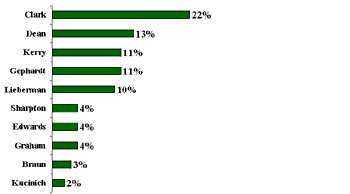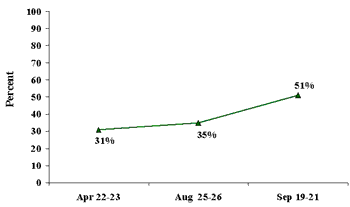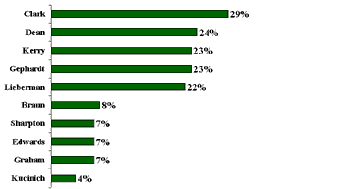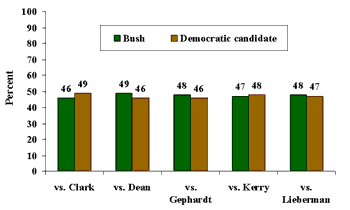GALLUP NEWS SERVICE
PRINCETON, NJ -- The latest CNN/USA Today/Gallup Poll shows Ret. Army Gen. Wesley Clark's entry into the race for the Democratic nomination has for the moment greatly changed the campaign's character. Just days after announcing, Clark has almost a 10-percentage-point lead over all other candidates for the nomination. Additionally, Clark tends to fare better among the leading Democratic candidates in hypothetical head-to-head matchups with President George W. Bush, although the data currently indicate the race would be close if the election were held today, regardless of which Democrat would oppose Bush.
The new poll, conducted Sept. 19-21, shows Clark leading the field of 10 Democratic candidates for that party's presidential nomination. Twenty-two percent of Democrats who are registered to vote say they are most likely to support Clark for the nomination, giving him nearly a double-digit lead over former Vermont Gov. Howard Dean (13%). Clark has a slightly larger advantage among Democratic registered voters over Massachusetts Sen. John Kerry (11%), Missouri Congressman Dick Gephardt (11%), and Connecticut Sen. Joe Lieberman (10%). None of the other candidates receive more than 4% support.
| Democratic Presidential Trial Heat Based on 423 Democrats and Democratic leaners who are registered to vote |
 |
| Sept. 19-21, 2003 |
Clark's announcement last week came just as Gallup observed a sharp increase in the percentage of Democrats who say they are closely following the news about the nomination campaign. An Aug. 25-26 Gallup Poll found just 35% of Democrats saying they were following news about the nomination very or somewhat closely, but in the latest poll, about half of Democrats (51%) say this.
| Percentage of Democrats Following News About
Candidates Running for Democratic Nomination Very/Somewhat
Closely Based on 480 Democrats and Democratic leaners |
 |
Clark has made a strong surge in recent weeks, and has greatly transformed the character of the race for now. When first included in the Democratic nomination "ballot" in late August, prior to his formal entry into the campaign, only 2% of Democratic registered voters said they were supporting Clark. Roughly two weeks later that support increased to 10% as the retired general's flirtation with a presidential bid attracted increasing media attention. And in the new poll, taken just days after his announcement that he would seek the nomination and only about 10 days after the prior poll, Clark's supported has more than doubled to 22% among Democratic registered voters.
The key question for Clark would be whether he can sustain this momentum. Polls conducted throughout the year have showed similar bounces for candidates just after they formally announced their intentions to run, but these increases have been short-lived. And as this suggests, much can change between now and the first crucial contests in Iowa and New Hampshire next January. Earlier Gallup analysis also shows that polls taken in the fall before the primary election season have not been good predictors of who the eventual Democratic nominee would be.
At this point, too, Clark is not well known among the general public. Fifty-two percent of Americans know Clark well enough to rate him, and the ratio of positive to negative opinions is 3-to-1 (39% to 13%). That leaves nearly half of Americans (48%) without a firm opinion on Clark either way.
The Democratic race was tight in the Sept. 8-10 CNN/USA Today/Gallup Poll, with Dean, Kerry, Lieberman, and Gephardt ahead of the remainder of the field, but each with only between 12% and 16% support. Earlier polls consistently showed Lieberman in the lead, although that was probably because of his higher name recognition among the public compared with the other contestants, combined with a low level of attention being paid to the campaign by most Democrats.
The new poll also asked Democrats who would be their second choice for the nomination, to help get a broader measure of the appeal each candidate has. These preferences will become more important once candidates begin to withdraw from the campaign, which could happen in early fall once third-quarter fundraising reports are released. When combining Democratic registered voters' first and second choices, Clark still has the greatest appeal among the candidates at 29%, but Dean (24%), Gephardt (23%), Kerry (23%), and Lieberman (22%) are fairly close behind. No other candidate registers 10% support.
| Democratic Presidential Trial Heat First and Second Choice – Combined Responses Based on 423 Democrats and Democratic leaners who are registered to vote |
 |
| Sept. 19-21, 2003 |
Trial Heats Suggest Close Presidential Election
For the first time in this election season, Gallup tested hypothetical presidential matchups between Bush and each of the five leading Democratic candidates. The data suggest the election would be close between Bush and any of the Democratic contenders if the election were held today, with the gaps among registered voters ranging from a three-point Democratic lead (Clark over Bush, 49% to 46%) to a three-point Republican lead (Bush over Dean, 49% to 46%), all within the poll's margin of error.
Forty-eight percent of registered voters would support Bush in a matchup with Gephardt, while 46% would opt for the Missouri congressman. The matchups between Kerry and Bush (Kerry over Bush, 48% to 47%) and Lieberman and Bush (Bush over Lieberman, 48% to 47%) are also close.
| Presidential Trial Heats: Bush vs. Democratic Candidates Based on 877 registered voters |
 |
| Sept. 19-21, 2003 |
As with the nomination data, the results of these ballots offer little guidance as to the eventual outcome of the election. Rather, they give a snapshot of what the outcome would be if the election were held today.
In the latest poll, 50% of Americans say they approve of the job Bush is doing as president, the lowest rating of his term so far. Fifty-one percent of Americans say they disagree with Bush on the issues that matter most to them, while 46% say they agree with the president. Nearly 6 in 10, however, say that Bush has the personality and leadership characteristics a president should have. While firmly in positive territory, this measurement is also among the lowest measured for Bush dating back to January 2000.
Survey Methods
These results are based on telephone interviews with a randomly selected national sample of 1,003 adults, aged 18 and older, conducted Sept. 19-21, 2003. For results based on this sample, one can say with 95% confidence that the maximum error attributable to sampling and other random effects is ±3 percentage points. In addition to sampling error, question wording and practical difficulties in conducting surveys can introduce error or bias into the findings of public opinion polls.
For results based on the sample of 877 adults who are registered to vote, the maximum margin of sampling error is ±4 percentage points.
For results based on the sample of 480 Democrats and Democratic leaners, the maximum margin of sampling error is ±5 percentage points.
For results based on the sample of 423 Democrats and Democratic leaners who are registered to vote, the maximum margin of sampling error is ±5 percentage points.
3. Next, I'm going to read a list of people who may be running in the Democratic primary for president in the next election. After I read all the names, please tell me which of those candidates you would be most likely to support for the Democratic nomination for President in the year 2004. [ROTATED:Massachusetts Senator, John Kerry, Connecticut Senator, Joe Lieberman, North Carolina Senator, John Edwards, Missouri Congressman, Dick Gephardt, Florida Senator, Bob Graham, Former Vermont Governor, Howard Dean, the Reverend Al Sharpton, Ohio Congressman, Dennis Kucinich, Former Illinois Senator, Carol Moseley Braun, Retired General, Wesley Clark]
BASED ON –480—DEMOCRATS OR DEMOCRATIC LEANERS
BASED ON –457—DEMOCRATS OR DEMOCRATIC LEANERS WHO ARE REGISTERED TO VOTE
|
|
|
|
|
|
|
|
|
|
|
None/ |
|
|
% |
% |
% |
% |
% |
% |
% |
% |
% |
% |
% |
|
|
All Democrats/Democratic Leaners |
|||||||||||
|
2003 Sep 19-21 |
21 |
12 |
12 |
11 |
9 |
5 |
4 |
4 |
3 |
2 |
17 |
|
2003 Sep 8-10 |
9 |
13 |
11 |
12 |
15 |
3 |
5 |
5 |
5 |
2 |
20 |
|
2003 Aug 25-26 |
2 |
11 |
9 |
23 |
13 |
4 |
5 |
6 |
4 |
1 |
22 |
|
2003 Aug 4-6 |
-- |
14 |
12 |
17 |
14 |
4 |
6 |
5 |
5 |
2 |
21 |
|
2003 Jul 25-27 |
-- |
10 |
16 |
20 |
14 |
5 |
6 |
5 |
6 |
2 |
16 |
|
2003 Jun 12-18 |
-- |
6 |
13 |
20 |
15 |
7 |
7 |
6 |
6 |
1 |
19 |
|
2003 May 31-Jun 1 |
-- |
5 |
16 |
21 |
14 |
7 |
7 |
4 |
3 |
3 |
20 |
|
2003 Apr 22-23 |
-- |
6 |
17 |
23 |
15 |
3 |
9 |
5 |
4 |
3 |
15 |
|
Democrats/Democratic Leaners who are Registered to Vote |
|||||||||||
|
2003 Sep 19-21 |
22 |
13 |
11 |
10 |
11 |
4 |
4 |
4 |
3 |
2 |
16 |
|
2003 Sep 8-10 |
10 |
14 |
12 |
13 |
16 |
2 |
5 |
5 |
4 |
2 |
17 |
|
2003 Aug 25-26 |
2 |
12 |
10 |
23 |
13 |
4 |
5 |
4 |
5 |
1 |
21 |
|
2003 Aug 4-6 |
-- |
15 |
12 |
18 |
15 |
4 |
5 |
5 |
5 |
2 |
19 |
|
2003 Jul 25-27 |
-- |
11 |
15 |
21 |
16 |
5 |
6 |
4 |
6 |
2 |
14 |
|
2003 Jun 12-18 |
-- |
7 |
13 |
21 |
17 |
6 |
6 |
7 |
5 |
1 |
17 |
|
2003 May 31-Jun 1 |
-- |
5 |
17 |
20 |
14 |
7 |
6 |
4 |
4 |
2 |
21 |
|
2003 Apr 22-23 |
-- |
6 |
18 |
22 |
16 |
3 |
8 |
5 |
4 |
3 |
15 |
4. Who would be your second choice?
COMBINED RESPONSES (Q.3-4); Percentages total more than 100% due to multiple responses
|
|
|
|
|
|
|
|
|
|
|
None/ no opin. |
|
|
% |
% |
% |
% |
% |
% |
% |
% |
% |
% |
% |
|
|
All Democrats/Democratic Leaners |
|||||||||||
|
2003 Sep 19-21 |
29 |
22 |
23 |
24 |
21 |
8 |
7 |
7 |
8 |
4 |
15 |
|
Democrats/Democratic Leaners who are Registered to Vote |
|||||||||||
|
2003 Sep 19-21 |
29 |
24 |
23 |
22 |
23 |
7 |
7 |
7 |
8 |
4 |
15 |
5. How closely have you been following the news about the candidates running for the Democratic nomination for president—very closely, somewhat closely, not too closely, or not at all?
BASED ON –480—DEMOCRATS OR DEMOCRATIC LEANERS
|
Very |
Somewhat |
Not too |
|
No |
|
|
% |
% |
% |
% |
% |
|
|
2003 Sep 19-21 |
13 |
38 |
35 |
14 |
* |
|
2003 Aug 25-26 |
10 |
25 |
39 |
26 |
* |
|
2003 Apr 22-23 |
4 |
27 |
40 |
29 |
-- |
Next, we'd like you to think about the general election for President to be held next year, that is in November 2004.
Q.6/6A-10/10A ROTATED
6. If retired General Wesley Clark were the Democratic Party's candidate and George W. Bush were the Republican Party's candidate, who would you be more likely to vote for – [ROTATED: Wesley Clark, the Democrat (or) George W. Bush, the Republican]?
6A. As of today, do you lean more toward – [ROTATED: Clark, the Democrat (or) Bush, the Republican]?
|
|
|
NEIT- |
OTHER |
No |
|
|
% |
% |
% |
% |
% |
|
|
National Adults |
|||||
|
2003 Sep 19-21 |
48 |
46 |
3 |
* |
3 |
|
Registered Voters |
|||||
|
2003 Sep 19-21 |
49 |
46 |
2 |
* |
3 |
7. If former Vermont Governor Howard Dean were the Democratic Party's candidate and George W. Bush were the Republican Party's candidate, who would you be more likely to vote for – [ROTATED: Howard Dean, the Democrat (or) George W. Bush, the Republican]?
7A. As of today, do you lean more toward – [ROTATED: Dean, the Democrat (or) Bush, the Republican]?
|
|
|
NEIT- |
OTHER |
No |
|
|
% |
% |
% |
% |
% |
|
|
National Adults |
|||||
|
2003 Sep 19-21 |
45 |
49 |
3 |
1 |
2 |
|
Registered Voters |
|||||
|
2003 Sep 19-21 |
46 |
49 |
2 |
1 |
2 |
8. If Missouri Congressman Dick Gephardt were the Democratic Party's candidate and George W. Bush were the Republican Party's candidate, who would you be more likely to vote for – [ROTATED: Dick Gephardt, the Democrat (or) George W. Bush, the Republican]?
8A. As of today, do you lean more toward – [ROTATED: Gephardt, the Democrat (or) Bush, the Republican]?
|
|
|
NEIT- |
OTHER |
No |
|
|
% |
% |
% |
% |
% |
|
|
National Adults |
|||||
|
2003 Sep 19-21 |
45 |
49 |
3 |
1 |
2 |
|
Registered Voters |
|||||
|
2003 Sep 19-21 |
46 |
48 |
3 |
1 |
2 |
9. If Massachusetts Senator John Kerry were the Democratic Party's candidate and George W. Bush were the Republican Party's candidate, who would you be more likely to vote for – [ROTATED: John Kerry, the Democrat (or) George W. Bush, the Republican]?
9A. As of today, do you lean more toward – [ROTATED: Kerry, the Democrat (or) Bush, the Republican]?
|
Kerry |
|
NEIT- |
OTHER |
No |
|
|
% |
% |
% |
% |
% |
|
|
National Adults |
|||||
|
2003 Sep 19-21 |
47 |
48 |
2 |
1 |
2 |
|
Registered Voters |
|||||
|
2003 Sep 19-21 |
48 |
47 |
2 |
1 |
2 |
10. If Connecticut Senator Joe Lieberman were the Democratic Party's candidate and George W. Bush were the Republican Party's candidate, who would you be more likely to vote for – [ROTATED: Joe Lieberman, the Democrat (or) George W. Bush, the Republican]?
10A. As of today, do you lean more toward – [ROTATED: Lieberman, the Democrat (or) Bush, the Republican]?
|
|
|
NEIT- |
OTHER |
No |
|
|
% |
% |
% |
% |
% |
|
|
National Adults |
|||||
|
2003 Sep 19-21 |
46 |
49 |
3 |
* |
2 |
|
Registered Voters |
|||||
|
2003 Sep 19-21 |
47 |
48 |
3 |
* |
2 |
